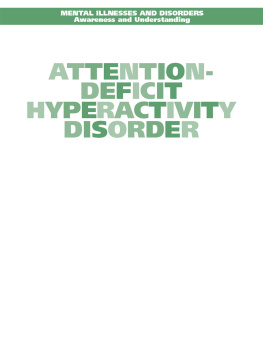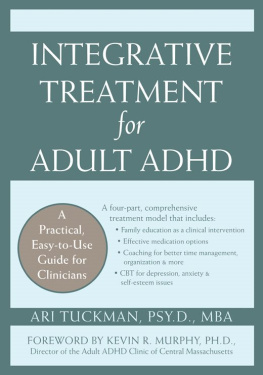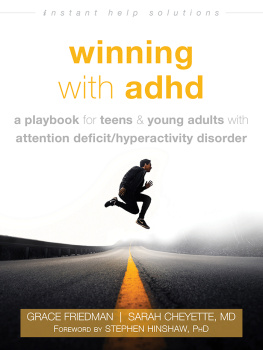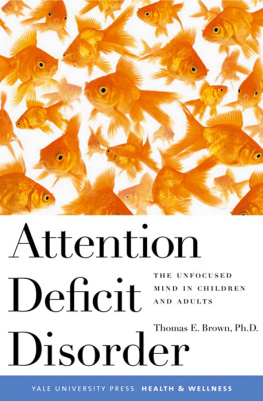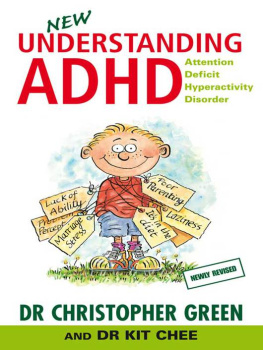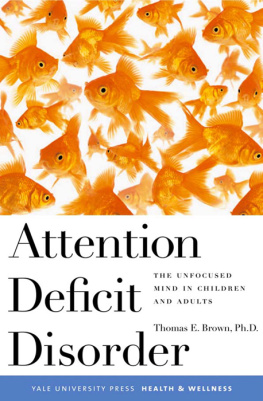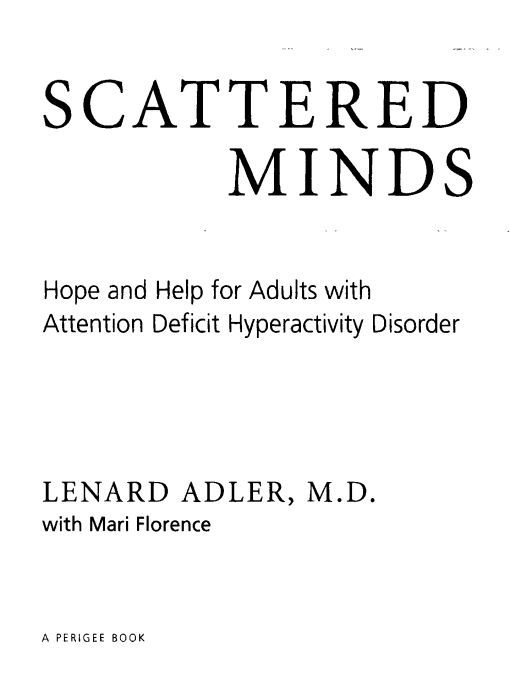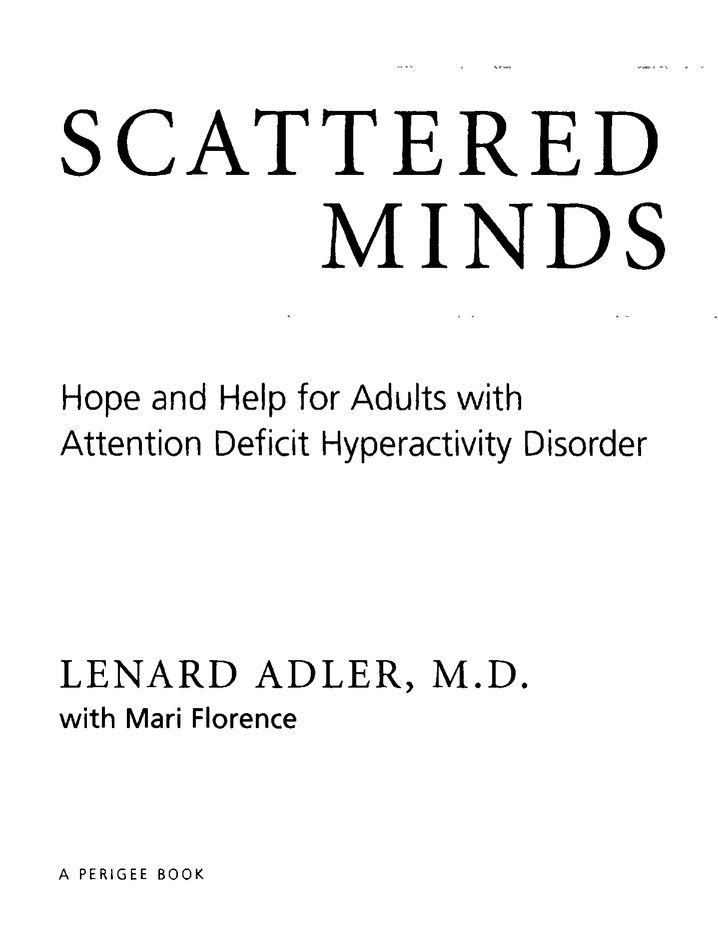Table of Contents
Praise for
Scattered Minds
Well organized and comprehensive, this is sure to become a valuable resource.
Library Journal
Balanced and highly informative, grounded in science, yet conveyed with his extraordinary bedside manner and sensitivity to the clinical needs of these adults. Well done, Dr. Adler.
Russell A. Barkley, Ph.D., Research Professor of Psychiatry,
SUNY Upstate Medical University
A welcome addition to the literture about adult attention deficit hyperactivity disorder (ADHD) ... Len Adler is well-known as both a clinical expert in ADHD and a regular contributor to the research literature on the topic. It thus comes as no surprise that the book combines clinical wisdom with empirical data in a manner that will be interesting, useful, and accessible for clinicians who treat ADHD and for patients seeking accurate and up-to-date information about the disorder.
Steven V. Faraone, Ph.D., Director, Medical Genetics Research;
Professor of Psychiatry and of Neuroscience and Physiology;
Director, Child and Adolescent Psychiatry Research,
SUNY Upstate Medical University
Scattered Minds is both accessible and readable. Whether you use it as a reference or read it cover to cover, it will enhance your bookshelf as you collect resources about ADHD.
Alan R. Graham, Ph.D., co-owner of ADDvisor
After reading this book, people with symptoms of ADHD should find comfort knowing that there are ways to live a very normal and successful life with ADHD.
Danielle Fisher,
youngest American to climb Mt. Everest
and youngest person (age 20) in the world
to climb the seven summits
Acknowledgments
A number of individuals over the years have been instrumental in my professional development and my understanding of adult attention deficit hyperactivity disorder (adult ADHD).
First and foremost, I would like to thank my patients. They have been gracious with their time and sharing their life stories with me. Their willingness to discuss their life experiences has been critical in furthering my understanding of adult ADHD. Their stories also form the backbone of this book.
My colleagues in the departments of psychiatry and neurology at the New York University School of Medicine, particularly Dr. John Rotrosen and the team at the Mental Health and Addictive Disorders Research Program, deserve special mention for their support over the last twenty-four years.
My cowriter, Mari Florence, has been instrumental in finding the right words and always making herself available to meet our deadlines. Her interns, Barbara Jarvik and Jennifer Chang, were quite helpful in conducting some of the background research.
A special note of thanks goes out to my editor, Marian Lizzi, and her team at Penguin. She provided the initial impetus for this endeavor and a steady hand throughout the writing. The final product that follows would not have been possible without her wisdom and counsel.
Last, I would like to acknowledge my parents, who provided ongoing support during my postgraduate education. My family, as always, has been incredibly understanding in lending their encouragement and in giving me the time needed to complete this endeavor.
To Rhonda
Foreword
I cant adequately describe what getting the diagnosis of attention deficit disorder (ADD) has done for me. To say that it has changed my life would be a gross understatement. Finding out about ADD and getting treatment for it have indeed given me a new life, even at my somewhat advanced age of fifty-nine. I just wish the average adult knew about this condition, and I wish the facts were more widely understood.
This comment, sent to me by a man in Michigan, resembles the literally tens of thousands of similar messages, letters, and e-mails I have received over the twenty-five years I have been treating attention deficit disorder. While the general public still widely thinks of ADD as a childhood condition, the greatest proportion of the grateful messages I receive come from adults.
These adults had been languishing prior to finding out about ADD. They had been living under the curse of what I call the moral diagnosis. Terms like bad, lazy, or incompetent had plagued them for most of their lives, terms that served no constructive purpose but did do the dirty, socially sanctioned work of morally judging these individuals, thus deepening the feelings of ineptitude, hopelessness, and despair with which so many of them slogged on through life, bravely bearing disappointment after disappointment and fencing with frustration after frustration.
Some adults with undiagnosed ADD lose the battle, in drug overdose, in violent crime, in car accidents, in prison, in reckless and dangerous behavior. But most survive, only to struggle with ongoing frustration and underachievement year after year.
This does not have to be. The darkness of the world of the moral diagnosis can and now ought to give way to the light of the medical diagnosis. What a bright new day knowledgesupplanting judgmentcan create.
Now, as we understand the mind in terms of biology rather than morality, in terms of science rather than voodoo, in terms of reason rather than superstition, the stigma and fear that used to surround mental and physical differences arevery graduallydissipating. One good example is the diagnosis of attention deficit disorder.
The diagnosis of ADD in an adult is a particularly dramatic event because it can reverse decades of suffering, decades of underachievement, frustration, lost jobs, fractured relationships, low self-regard, and a host of other problems that proper diagnosis and treatment can address.
There are very few diagnoses in all of medicine that carry with them as much realistic hope for improvement as does the diagnosis of ADD in an adult. The major obstacle is that most peopleincluding many doctorsdo not know much about the condition, nor do they know how to diagnose it or treat it.
Enter this excellent book. Dr. Len Adler, researcher and clinician extraordinaire, has composed a superb introduction to ADD in adults that he has aptly titled Scattered Minds. But this book is anything but scattered. Whether you are a professional or a layperson, this book will give you all you need to know, laid out in clear and well-organized prose.
I believe that as you read this book, you will also gain hope and enthusiasm. A better life awaits millions of adults, and the first step is to read and understand the information you hold in your hands.
Edward M. Hallowell, M.D.,
coauthor of Driven to Distraction,
Delivered from Distraction,
and author of CrazyBusy
INTRODUCTION
Stop, Look, and Listen
This book is the culmination of ten years of working with adults with ADHD and related disorders. As director of the Adult ADHD program at New York University, I have been involved in myriad studies relating to the disorder, and I played a role in creating screening and diagnostic tools that help identify the condition with accuracy. Along with my colleagues and many inspiring patients, I have worked to find new ways to manage the condition, which you will read about in this book.


